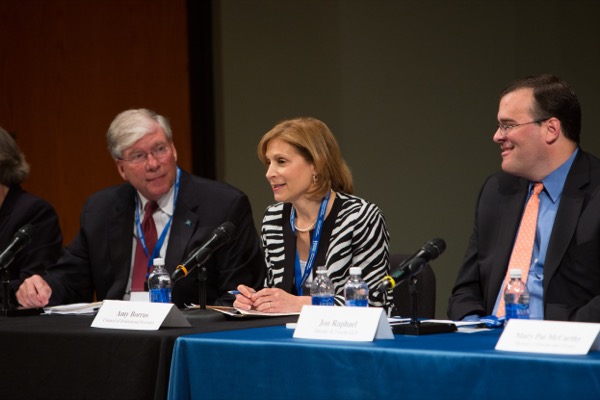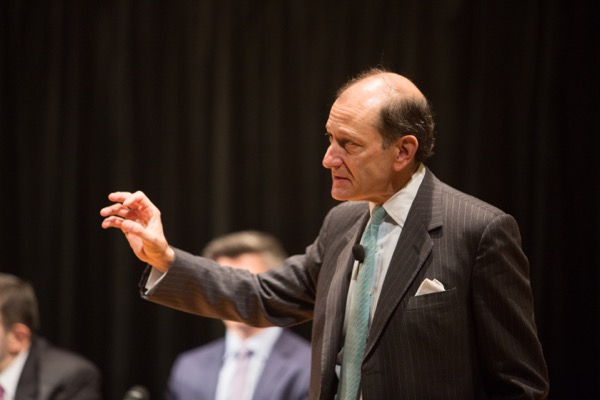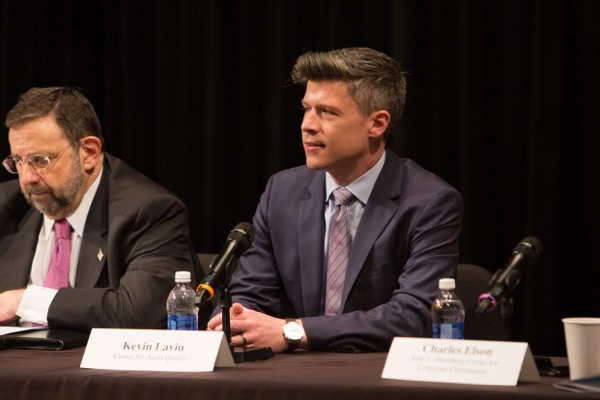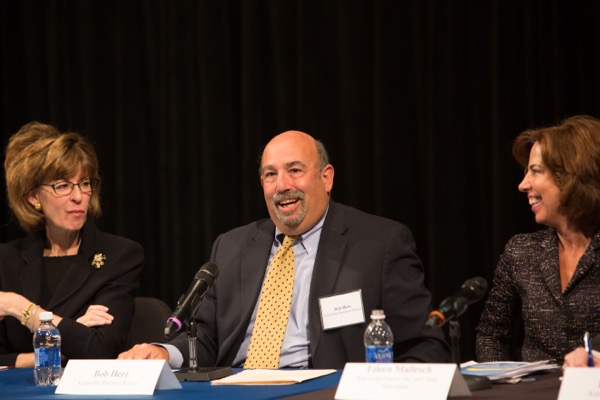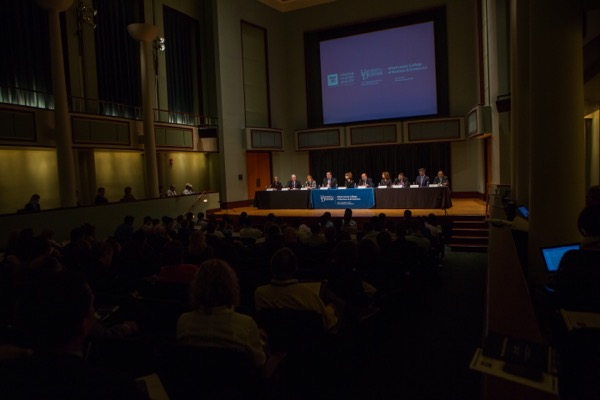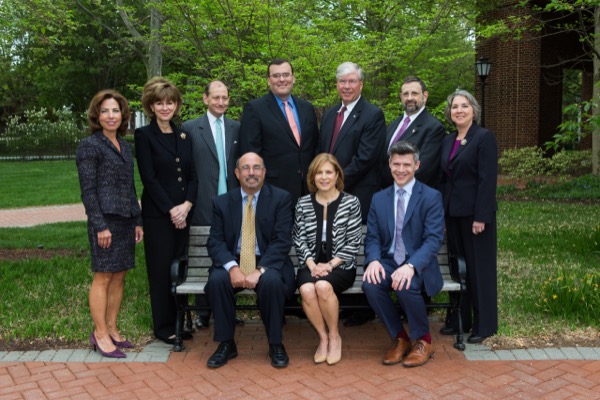Auditor of the future
Weinberg Center panelists discuss critical developments in auditing profession
11:05 a.m., May 28, 2015--A dynamic and global economy is reshaping markets and pushing industries, professions and companies to reexamine how they operate. Public company auditors are no exception. During difficult economic times like the recent global financial crisis, liability often falls on auditors, who review important financial statements and provide assurance to investors.
New threats to cybersecurity and opportunities presented by the emergence of data analytics raise the questions of whether auditors should be asked to provide assurance on more than financials, how far will the auditor’s responsibility will go and at what new skills auditors need to provide this assurance.
Campus Stories
From graduates, faculty
Doctoral hooding
The University of Delaware’s John L. Weinberg Center for Corporate Governance hosted a program on “The Auditor of the Future” this month, featuring discussions about these crucial issues facing auditors.
Co-sponsored by the Center for Audit Quality and the Department of Accounting and MIS in UD’s Alfred Lerner College of Business and Economics, the program featured a panel of prestigious experts and professionals, including:
- Jeanette M. Franzel, board member, Public Company Accounting Oversight Board.
- Robert H. Herz, member, Standing Advisory Group, Public Company Accounting Oversight Board; president, Robert H. Herz LLC; executive-in-residence, Columbia Business School, Columbia University; director and chair, Audit Committee, Morgan Stanley; director and member, Audit Committee, Fannie Mae; director, Workiva Inc.; former chairman, Financial Accounting Standards Board.
- Kevin Lavin, professional practice fellow, Center for Audit Quality.
- Eileen Mallesch, director and chairperson, Audit Committee, Bob Evans Farms Inc.; director and chairperson, Audit Committee, State Auto Financial Corporation; former senior vice president and chief financial officer, Property and Casualty segment, Nationwide Insurance.
- Mary Pat McCarthy, director and chair, Audit Committee, Mutual of Omaha Insurance Co.; director and member, Audit Committee, Tesoro Corp.; former vice chair, KPMG LLP.
- Harvey L. Pitt, CEO and managing director, Kalorama Partners LLC and Kalorama Legal Services PLLC; former chairman, Securities and Exchange Commission.
- Jon Raphael, chief innovation officer, Deloitte and Touche LLP.
- Henry du Pont Ridgely, senior counsel, DLA Piper LLP (US); former justice, Delaware Supreme Court.
- Amy Borrus, deputy director, Council of Institutional Investors.
Moderating the panel was Charles Elson, UD’s Edgar S. Woolard, Jr. Chair in Corporate Governance, professor of finance and director of the Weinberg Center.
Developments in technology
From the discussion’s beginning, panelists agreed that the auditor of the future will be heavily influenced by upcoming developments in technology.
Technology “in the marketplace now, like natural language processing and artificial intelligence, aren’t science fiction anymore,” said one panelist. “Those are things that we’re experimenting with today and already deploying as part of our audits.”
The panelist called it “an incredibly exciting time” to be in the auditing profession due to these recent leaps and bounds in technological advancement.
He added that the “goal is not to take the auditor out of the equation with technology,” but instead to “give the auditor more time to focus on their professional excellence, skepticism and judgment.”
The panelist also pointed out that auditing is uniquely positioned due to its close relationship with large swaths of data. Another panelist elaborated, calling the use of this big data in the future “intriguing.”
She noted that the days of auditors sampling and ad hoc picking out transactions might be over, and that auditors might soon be able to look at data in its entirety, perform analytics and learn from data how to audit smarter in the future.
“Those kind of techniques are very exciting because you can spend less time doing work and more time sitting back, looking at the results and analyzing,” agreed another panelist.
Considering cybersecurity
Another hot topic in auditing today is that of cybersecurity, and some clients now request that auditors provide some assurance of cybersecurity systems in addition to financial measures.
However, one panelist said that requiring the external auditor to be responsible for evaluating cybersecurity as part of the financial reporting process is problematic and deserves caution.
This is because, he said, all companies with computers experience cybersecurity issues at some point, as “the villains engaged in successful cyberattacks are deviously clever.”
He further noted that cybersecurity is the responsibility of management, and auditing firms are unprepared to assume the burden of liability for cyberattacks.
He added that it might even be misguiding investors for auditors to advise in this area, which is not their specialty, and that such tasks would be better performed by experts like cybersecurity firms, who can devote their full energy to staying ahead of hackers and updating technology.
Expanding role of the auditor
And the issue of cybersecurity represents an even larger topic of debate for panelists: the seemingly ever-expanding role of the auditor.
One panelist explained that, given changing business practices, global environments and technology, clients now expect auditors to be “continually upping their game.”
But this is a problem, a second panelist said, because, “The more factors one adds on to what the audit is supposed to provide, the greater the liability will become.”
“How can anyone reasonably provide the level of expertise for the audit to focus on many of these issues?” asked another in agreement.
Further, a number of panelists said that more work must be done to enhance the quality of the current audit process before expanding the scope of the auditor’s responsibility to providing assurance in other areas.
But another panelist said that an auditor of the future with expanded expertise is nothing to be afraid of.
“It’s extremely important that the firms and regulators stay in touch with what’s happening with the changing nature of business and technology,” she said. “We need innovation and modernization, and auditors need to respond to the changing needs of investors and the market. Frankly, if we don’t do that, the audits will become irrelevant.”
Auditor independence
Also discussed by the panel was the often-debated subject of auditor independence.
One panelist said that independence prevents auditors from developing the expanded skill sets they need, since independence standards prevent auditors from auditing companies for which they already perform consulting work.
He called this division ironic and counterintuitive.
“We’re not allowing audit firms to utilize their expertise for audit work, and yet we are demanding that they get the audit correct in areas of expertise that are all expanding,” the panelist said. “The audit practice cannot take advantage of the reservoir of skills that audit firms have.”
But other panelists disagreed, with one asking, “If you’re an investor, and you want to ensure you’re getting the right level of assurance, wouldn’t you want greater transparency?”
“Independent auditors are uniquely qualified beyond any other profession because of their independent mindset,” she continued.
One panelist added that independence is “a hallmark of our profession,” and another said that objectivity “gives auditors their unique advantage in the markets.”
Additionally, another panelist said that instead of sacrificing independence for expertise, audit firms are increasingly consulting with outside specialists.
Panelists also noted a number of changes in the world of auditing that mirror industries in the rest of the world.
“There’s a greater move, like everything in society, to diversity, to mobility around the world and to work-life balance,” said one panelist as examples.
Another move in the world of auditing that reflects the environment around it is overall improved communication, which is particularly critical since audits serve as the main communication between auditors and their clients.
“It’s clear that there’s a hunger amongst investors for more information, a more fulsome discussion,” said one panelist.
“The investment world is expecting much greater transparency from auditors,” said another. “That is starting with much better communication with audit committees in the past few years.”
He added that, in his experience, this change has led to auditors and clients engaging in “a much richer dialogue.”
Another panelist has also noticed this trend toward “communication behind the black box of what the audit is.”
“As a proud member of the profession, I think that’s a good thing, because an audit, properly done, is a very rich exercise,” he said. “More of that ought to be understandable to investors.”
Article by Sunny Rosen
Photos by Ambre Alexander Payne






